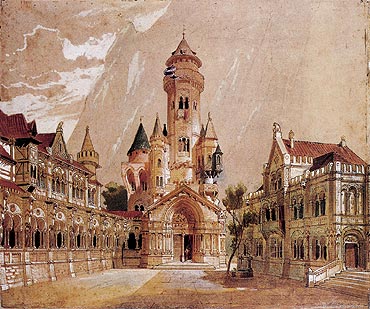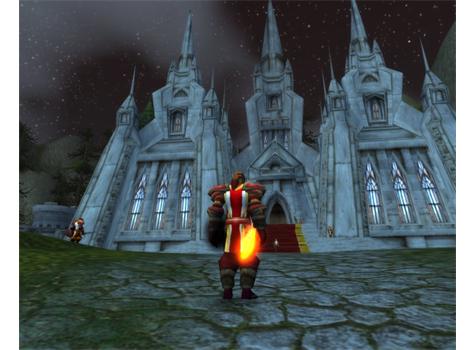
What we're seeing is a huge growth of casual gaming, mobile gaming, and entertainment based on simple web apps. These games are cheap to produce, and deliver a small burst of simple fun, accessible by anyone. They don't require much investment in time, and you can get them anywhere, any time. They're mostly disposable, but they pass the time. It's like pop music. The three-minute pop song has taken over. Most songs - even the popular ones - are simple, formulaic, and forgettable, but they're ubiquitous and profitable.

By comparison, Big Games are expensive, hard to make, and only available to a minority, who can afford the right hardware. They can be profitable, but many (most?) aren't. Halo, WoW, and the like are the exceptions. Their business model is a gamble - the same gamble as movies. You pour money in, release it, and hold your breath to find out whether you've made your money back inside two weeks, or else you've had it. In many ways, they represent the apex of this art form. They're rich, they're deep, they're beautiful to look at, and they're incredibly well produced. But they take time to appreciate and to learn. They're not something you just dip into. That's opera. It's big, luxurious, expensive, and only really appreciated by a minority who regard themselves as more cultured than the hoi polloi.
(For the record, I'd like to state that I like opera. Especially Wagner.)
I reckon most WoW players will be pretty steamed up by now. Look at the size of the audience, you're saying. Look how popular it is. It's mainstream. What do you mean?
OK, let's look at the size of the market. So there are maybe 10m people who play WoW. There are 50m people who have played Line Rider. 150m people played Scrabulous. Habbo Hotel has 115m subscribers. Nintendogs, Brain Training and the like are still selling 1m units a week after a year or more. And WoW's one of the biggest of the big dogs - most other MMOs and AAA games struggle to hit 1m players.
Next, accessibility. 30% of people access the Net exclusively via a mobile device. 30% more access the Net via a mobile device at least 50% of the time. In other words, the computer is now a minority way to get to the Net, and its share is shrinking. Even within the computer space, there's a drive towards entry level machines. Although technology is improving, a smaller and smaller proportion of people have top end kit. Most people have low-cost machines. So when you design for the top graphics cards and powerful CPUs, you're designing for a smaller and smaller proportion of a shrinking market.

Then there's the learning curve. How long does it take to learn to play WoW? And play it well? And how long to learn to throw penguins into space with a rubber band? You've got to be pretty dedicated to even bother getting into something as rich as WoW. In fact, it's not just a game, it's a lifestyle choice, and most people don't actually want to devote their lives to a game.

So sure, if you're a loyal WoW player, then WoW is the biggest thing in the world. Take a few steps back, look at the bigger picture, and it's really just a small niche.
This isn't an attack on Big Gaming. It drives innovation, it's hugely entertaining, and it lays down cultural benchmarks. It's a perspective shift. The entertainment world is now dominated by new forms of games. They may not be as good or as memorable as the Big Games, but that's where the money is, and where the majority of the people are. Are we, perhaps, seeing the beginning of the end of this branch of the art form?
Maybe what we should be looking out for is the Andrew Lloyd Webber of the game world. All the trappings of opera, but with plenty of tunes you can hum and mass appeal.



11 comments:
I just spoke to Raph about the Andrew Lloyd Webber analogy and watched him look faintly nauseous...
Makes sense. Kind of boring though? (not you Matt :) the disposable games)
I think you would have to be switched on by the money making aspect (or the technical challenge)to get into this market.
I guess the irony is that capturing the market, riding the wave is the 'big game' for successful businesses, and the product could be seen as somewhat secondary? - Kate
Short-play games don't have to be boring. It's the equivalent of making TV rather than films. Some stuff sticks - Dr Who, for example?
And I'd actually argue that the creativity that goes into some of these light titles is immense, and there's the satisfaction of knowing it's all your own work, not a huge team (i.e committee) production. I'd be happier being the guy who designed and built LineRider than being the guy who did a little bit of level design (which then got butchered by the dev team) on some monster production.
Linerider is cool, it has a huge creative element, it's possible to get into it in more depth and it has a community. I like open ended environments in which you can set your own goals and make your own stuff. Unfortunately there are lots of long form games which aren't that compelling either. I think you have to get some intrinsic satisfaction from winning, or levelling up in order to make those games interesting.- Kate
A large part of gaming is the social aspect, whether it be a MMORPG, or simply the internet as giant chat room.
I feel a blog post about "what is a game" coming on. The social aspect is all-important. (Read Homo Ludens) Arguably, it's more important than the actual game. That's why Habbo is 10x bigger than WoW.
Here's where my thoughts are starting. Which of the following would you call "games"? In the last few days I've had people argue that each of these is or isn't a game:
The Sims
Second Life
Moviestorm
Habbo
Stardoll
Singstar
Keeping it to those I know best, sims is, second life isn't but you can play games in it, Moviestorm isn't but you can play with it if you want to.
I also thought of a shortform game I like, Tetris.
For me it has parallels with emotional life, when things get full up or overwhelming, decision making gets difficult. On occasion something comes along, like the single brick in the right place, and suddenly all sort of things make sense at once and my mind becomes clear.
The story makes sense, even though it is very abstractly told.
I was also thinking about playing tombraider 2 with my daughter. On the roof of the opera house in Venice, there's no way forward without shooting a dog, and she became distressed about the situation. So we made up an imaginary extra Venice level, where Lara goes shopping and opens a dog sanctuary.
In my mind, this is the limitation of preset games. You are stuck in the mind of the developer(s), who in this case didn't imagine it would upset anyone to shoot an imaginary dog.
Creative virtual environments feel much more adaptable to me - Kate
What is the definition of a 'game'?
Now that's a good question, and one which isn't as straightforward as you think. It's like the "what is art" question, except that "I know it when I see it" doesn't work so well for games.
I know it when I play it?
To quote that deep philosophical film, Crocodile Dundee:
"It's not a game, Mick!"
"It is to me."
Which pretty much sums up why it's next to imposssible to define a game. It's subjective.
(I'm also wishing I hadn't put that big pic of Britney Spears at the head of this blog post. I'm getting sick of the sight of her. As a symbol of a world dominated by celebrity over substance, it's a very effective image, but still... )
Post a Comment